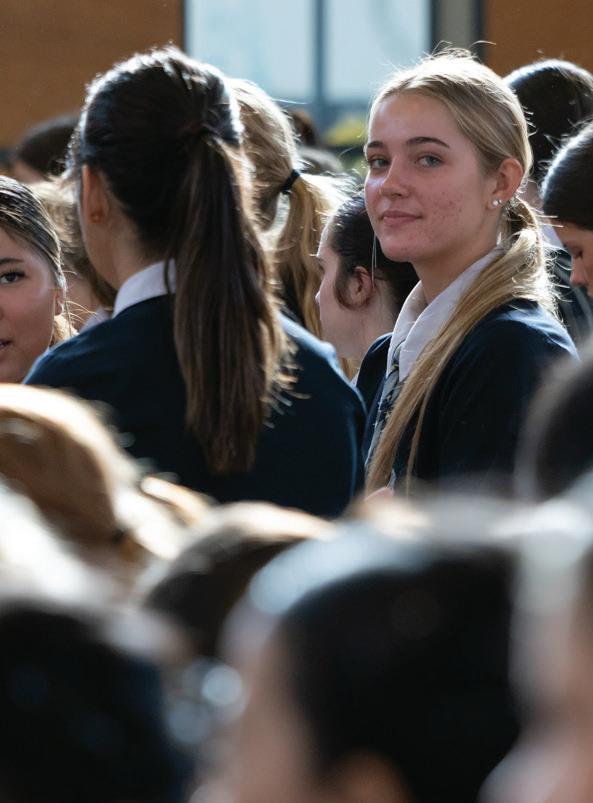
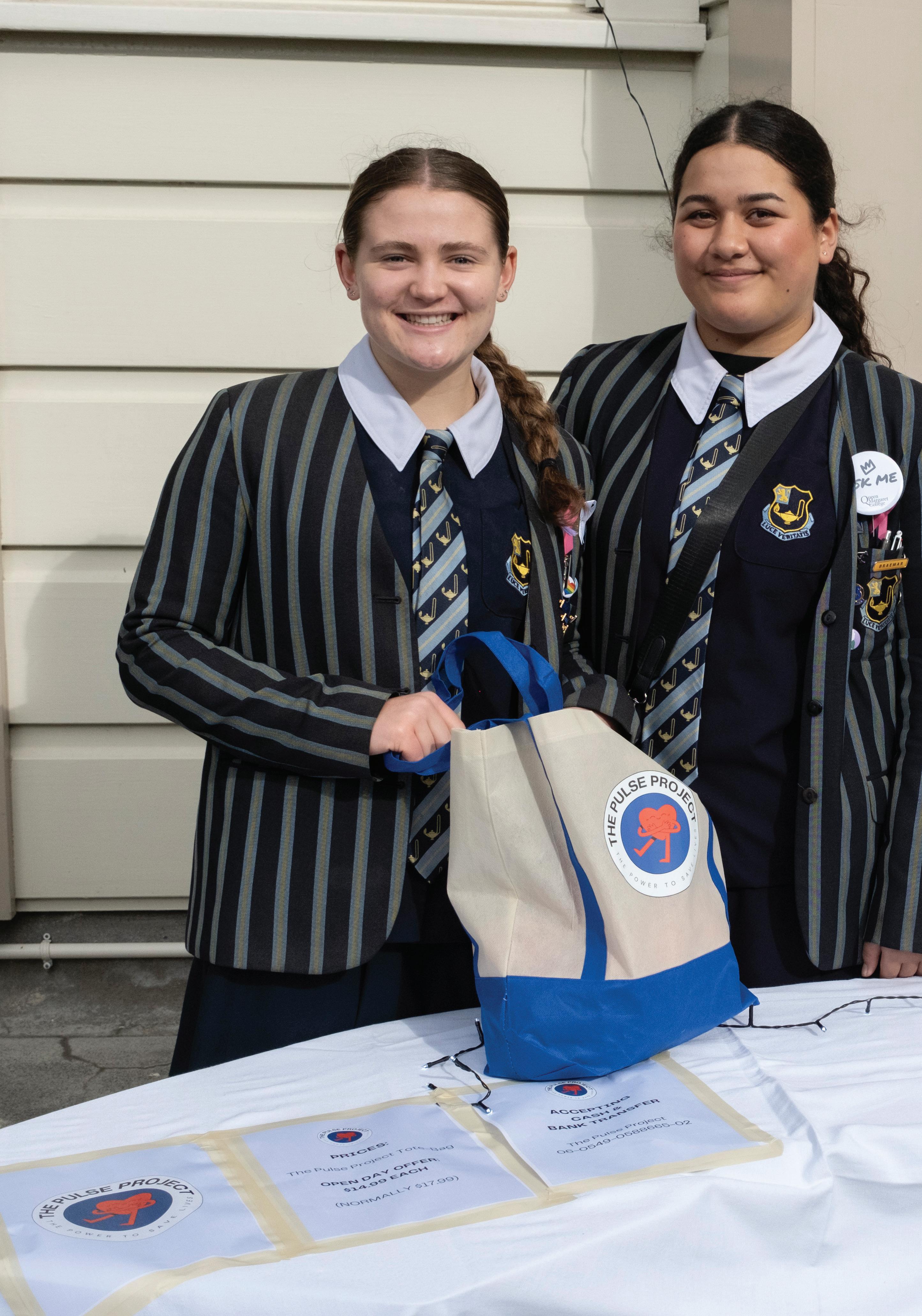





Welcome to the Queen Margaret College National Certificate of Educational Achievement (NCEA) Subject Selection Handbook for Years 12 and 13. The purpose of this booklet is to help you make the best subject choices to meet your particular needs and preferred tertiary pathway. You need to study this guide very closely and carefully discuss your options with those people who can assist you to make an informed choice. As well as talking to your parents and friends, help is available from people at school.
Principal Jayne-Ann Young
Deputy Principal – Learning and Teaching
Deputy Principal – Wellbeing
Careers Director
English & Media Studies
Humanities
Languages
Mathematics
PE & Health
Arts
Science
Technology
Year 11
Year 12
Year 13
Holly Payne
Fiona Crawford
Bee Laing
Annabel Harris
Adrian Hardy
Caroline Harding
Matthew Kavanagh & Mike Lockwood
Aimee Francois
Tim Jenkin
Rebecca Hickey
Richard Knuckey
Deans, subject teachers and tutor teachers are more than happy to help but ultimately this is a family decision. Even though it is early days, it is also sensible to check university websites regarding entry requirements for particular courses.
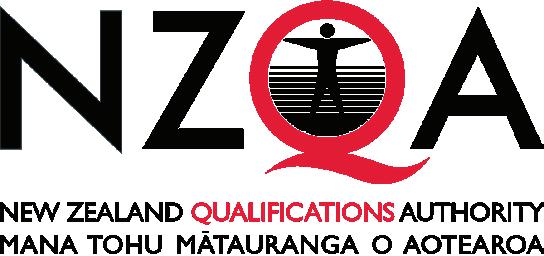

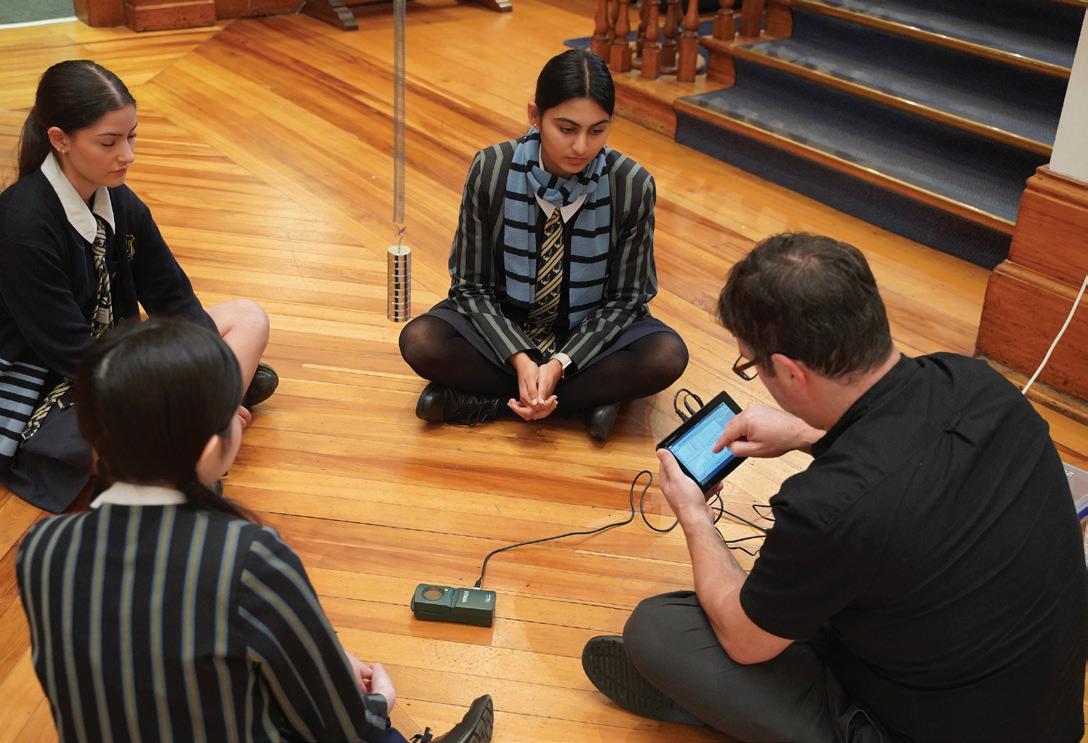
Students entering Years 12 and 13 should be making subject choices related to their long-term educational goals and (possible) career choices. Information gathering is important at this stage. As well as considering whether to do the IB Diploma or NCEA in Years 12 and 13, students should be aware of their abilities, aptitudes and interests and are encouraged to take into account this information when they select their subjects.
Mathematics is necessary in so many careers, and, while it is optional from Year 12 onwards, it should be included, if at all possible.
In Year 12, English is compulsory. Students study a total of six subjects unless a different course is negotiated with the Deputy Principal – Learning and Teaching, Holly Payne (holly.payne@qmc.school.nz).
In Year 13, there are no compulsory subjects. Students study five or six subjects in order to maximise their chances of getting the best possible certificate endorsement and course endorsements.
A scholarship programme runs in Year 12 & 13. Scholarship is offered in all Level 3 subjects to all students, whether studying NCEA or IB Diploma. Individual subjects run classes throughout the year, the aim of which is to deepen content knowledge as well as develop critical thinking skills. Scholarship requires students to demonstrate a high level of synthesis, integration and application of ideas and breadth of knowledge and understanding.
Every effort is made to accommodate each student’s subject choices. However, it is not always possible to do this. Where there are clashes in subject choices or the class size is too small, students may be asked to make another choice.
NCEA comprises three levels of achievement. NCEA Level 1, 2 and 3. At Queen Margaret College, some students are multi- levelling to suit their abilities and future pathways. We believe that every student should study a challenging yet satisfying course. Generally, Year 12 students do NCEA Level 2 and Year 13 students, NCEA Level 3, but we have some students who are doing a multi-level course.


For a student to be awarded NCEA Level 2 they must achieve 60 credits at Level 2 or above. Students must also have met the Level 1 literacy and numeracy requirements (10 credits).
For a student to be awarded NCEA Level 3 they must achieve 60 credits at Level 3 or above. Students must also have met the Level 1 literacy and numeracy requirements (10 credits).
The NCEA qualification encourages students to achieve the best possible results and there are two endorsements to acknowledge this:
ϐ NCEA Level 2 or 3 certificate endorsed with Excellence which requires 50 credits at Excellence at the required level.
ϐ NCEA Level 2 or 3 certificate endorsed with Merit which requires 50 credits at Merit or higher at the required level.
ϐ Credits obtained at the required level can be carried over from previous years.
ϐ If students achieve 14 credits at Excellence in a QMC Year 12 or 13 course, they will have the subject endorsed with Excellence.
ϐ If students achieve 14 credits at Merit or higher in a QMC Year 12 or 13 subject, they will have the subject endorsed with Merit.
ϐ The course endorsement must include at least 3 credits from externally assessed standards and 3 credits from internally assessed standards. There are some exceptions where the course is completely internally assessed.
ϐ The course endorsement applies in the year the subject is studied and credits obtained in previous years cannot be carried over.
Further information on the NCEA is available on the NZQA website: www.nzqa.govt.nz.

NZQA no longer charges fees for domestic students to enter NCEA or Scholarship Assessments. Fees are still payable by international students. Further information can be found at www.nzqa.govt.nz.
However, students will be subscribed to a learning management package. This will provide access to digital learning content. There will be a single charge of approximately $90.
NCEA Level 3 Certificate is required including at least 14 credits in each of 3 approved subjects. All students must also satisfy the literacy and numeracy requirements which are:
ϐ Numeracy–10 credits numeracy at Level 1 or above, made up of co-requisite Level 1 numeracy or certain achievements standards specified by NZQA
ϐ Literacy–10 credits at Level 2 or above with 5 credits from Reading and 5 credits from Writing. These can be obtained from English or other approved subjects.

New Zealand Universities continually review their entry requirements both to the university and/or to particular courses. This may be higher than stated above and it is recommended that students check acceptance criteria with the Universities. A list of University websites is included in this Handbook.
Scholarship is a monetary award to recognise New Zealand’s top students annually. It does not attract credits nor contribute towards a qualification, but the fact that a student has gained a scholarship will appear on their Record of Achievement.
and is a prestigious achievement. Talented students are encouraged to enter one or more Scholarship subjects as well as their Level 3 assessments.
Student performance will be assessed externally against a schedule that ensures a ranking of candidates is produced. For each standard there are three levels of reporting:
ϐ Scholarship not attained
ϐ Scholarship
ϐ Outstanding Performance.
The number of awards in each subject will be based on the proportion of the number of students in Year 13 entered for national assessment in those subjects.


Recommended Previous Study
Completion of Level 1 Biology and Chemistry or approval by Deputy Principal - Learning and Teaching.
Course Description
Through the study of cellular and genetic processes students will further develop their understanding of the links between biological structure and function. Students will also examine the validity of biological information presented to the public. Practical skills will continue to be
developed as students plan and carry out an investigation into cellular processes. It is recommended that students have achieved the Biology achievement standards in the Year 11 Biology & Chemistry course.
Contributions
ϐ Students will be charged approximately $25 for a workbook.


Recommended Previous Study
Completion of Level 2 Biology, or approval by Deputy Principal – Learning and Teaching.
Course Description
NCEA Level 3 students build on their genetic understanding from Year 12 and study how different species have evolved. The story of human evolution allows students to discover the links between biological and
Demonstrate
Carry out a practical investigation in a biological context,
cultural evolution. An understanding of homeostasis will be developed through the study of blood glucose levels.
Contributions
ϐ Students will be charged approximately $25 for a workbook.

Recommended Previous Study
Completion of Level 1 Business and Economics is an advantage, but all students who achieve NCEA Level 1 can select this course.
Course Description
This course combines NCEA Level 2 achievement standards from Business Studies and Economics to prepare students for future studies in commerce. Economics is the study of scarcity, resource allocation and the methods and processes by which choices are made in the satisfaction of human wants. Students will investigate

the economic issues of inflation, government economic policies, and economic growth. They will also learn about marketing research. Students do not need to have studied Business & Economics previously to choose this course, although the knowledge gained from Year 11 will be useful throughout this course.
Contributions
ϐ All students will be issued with individual workbooks at a cost of approximately $45.


Recommended Previous Study
Completion of Level 2 Business and Economics or approval by Deputy Principal - Learning and Teaching.
Course Description
Business Studies and Economics at Level 3 builds upon Level 2 concepts of developing marketing and entrepreneurial skills. They will be working in consultation with the Young Enterprise Scheme in the development of their business activity. This will include: product design, production, marketing, sales and finance. This will involve taking a product to market with clearly defined goals based around economic, social, cultural and environmental sustainability.
The focus for the Economics aspect of the course is to explore the New Zealand economy in relation to macro-economic goals and use economic models to illustrate concepts. This gives a useful understanding of the economy and how the government influences businesses. The focus is on economic growth, inflation, unemployment and government decision making.
Contributions
ϐ All students are registered with the Young Enterprise Scheme (approximate cost $45). All students will be issued with individual workbooksat a cost of $30.

Recommended Previous Study Merit in the Level 2 algebra, trigonometry and calculus standards or approval by Deputy Principal - Learning and Teaching.
Course Description
NCEA Level 3 Calculus involves students thinking about abstract mathematical concepts, with a particular emphasis on algebra, trigonometry and calculus. Students

taking this course may be intending further studies that require a robust mathematical background, such as physics, engineering, technology or economics.
Contributions
ϐ All students will be issued with individual workbooks at a cost of approximately $45.


– Level 2
Recommended Previous Study
Achieved in the chemistry achievement standards offered in either of the Level 1 Science courses or approval by Deputy Principal - Learning and Teaching.
Course Description
This course includes developing an understanding of central concepts and patterns in Chemistry, and the carrying out of qualitative and quantitative investigations.
Carry out a practical investigation into a substance present in a consumer product using quantitative analysis.
Demonstrate understanding of bonding,
properties
Demonstrate
Demonstrate understanding of the
Contributions
ϐ Students will be charged approximately $25 for a workbook.


Recommended Previous Study
Level 2 Chemistry course or approval from the Deputy Principal - Learning and Teaching.
Course Description
The Year 13 Chemistry course builds on content covered in Year 12 Chemistry in the topics of atomic structure and bonding, organic chemistry and thermochemical principles. They also learn to use spectroscopic data to determine the structure of organic molecules and what reduction and oxidation reactions are and how to predict when they will occur. Students complete the 2 externals and 2 internals in a comprehensive chemistry course.
Demonstrate understanding of thermochemical principles and the properties of particles and substances.
Demonstrate understanding of chemical processes in the world around us.
Demonstrate understanding of spectroscopic data in chemistry.
Demonstrate understanding of the properties of organic compounds.
Contributions
ϐ Students will be charged approximately $25 for a workbook.


Recommended Previous Study
Completion of Level 1 Chinese course or approval by Deputy Principal - Learning and Teaching.
Course Description
Students will study topics such as education systems, leisure and sport, part-time employment, relationships, health, and travel. By the end of the course, they will be able to communicate a range of information, including unfamiliar content, and justify their ideas and opinions in both spoken and written Chinese. They will learn to initiate and sustain dialogue in familiar contexts and further develop their fluency.
Give a spoken presentation in Chinese that communicates information, ideas and opinions.
Demonstrate understanding of a variety of written and/or visual Chinese text(s) on familiar matters.
Write a variety of text types in Chinese to convey information,
contexts.
Assessment
For internal assessment, students will deliver a prepared two-minute speech and produce a range of written texts for authentic purposes. In addition, they will sit listening and reading comprehension examinations at the end of the year. Regular conversation sessions with the Chinese language assistant will support the development of their speaking and listening skills.
Contributions
ϐ Students will be charged for a booklet of photocopied material costing around $10.

Recommended Previous Study
Completion of Level 2 Chinese course or approval by Deputy Principal - Learning and Teaching.
Course Description
The aim of this NCEA Level 3 course is to enable students to interact in a variety of situations, recognise finer details in spoken and written Chinese texts and draw conclusions.
Demonstrate understanding of a variety of extended spoken Chinese texts.
Give a spoken presentation in Chinese that communicates a critical response to stimulus material.
Interact clearly using spoken Chinese to explore and justify varied ideas and perspectives in different situations.
Demonstrate understanding of a variety of extended written / or visual Chinese text(s).
Write a variety of text types in clear Chinese to explore and justify varied ideas and perspectives.

Students use basic language patterns spontaneously and develop and support their points of view. They study the following topics: overseas travel, the history and geography of cities in China, communication and media, environmental issues and migration.
Contributions:
ϐ Students will be charged for a booklet of photocopied material costing around $10.
(AS91534, 3.2 Can be taken in place of 91535 or optional extra standard)
3.4

Recommended Previous Study
Completion of Level 1 Digital Technology course or approval by Deputy Principal - Learning and Teaching.
Course Description
This course is designed to introduce akonga to a wide range of elements that form part of the exciting and ever changing world of digital technology. Students will solve real life problems and communicate these solutions

visually. Students will learn to design and develop websites using HTML and CSS, and develop simple web applications using the programming language Python. Throughout the creation process, students will test, evaluate and model their digital solutions, and reflect on their own ability to manage the risks associated with creating digital outcomes.
Contributions
ϐ There is no fee for this course.

Recommended Previous Study
Completion of the Level 2 Digital Technology course or approval by Deputy Principal - Learning and Teaching.
Course Description
This course would be of interest to students wishing to pursue a career in the software industry, web Development, gamification, or those who have an interest in computer hardware. Building on the Year 12 course, students will further develop and refine their skills in
Present a reflective analysis of developing a digital outcome.
Develop a conceptual design considering fitness for purpose in the broadest sense 6 credits (internal).

digital imaging, web design, computer programming, gamification, and computer science. Throughout the creation process, students will test, evaluate and model their digital solutions. They will also provide a reflective analysis of what is involved in developing a digital outcome.
Contributions
ϐ There is no fee for this course.


Recommended Previous Study
Completion of Level 1 Drama course or approval by Deputy Principal – Learning and Teaching.
Course Description
Students learn how to effectively apply the techniques of Drama in performance with a focus on the communication of subtext. They participate in the production of a selected script and develop their understanding of how production technologies work in combination to support a production
Perform a substantial acting role in
Devise and perform a Drama to realise an intention.
Apply Drama techniques in a scripted context.
Discuss drama elements, techniques, conventions and
concept. A unit of work on devised theatre challenges students’ creativity and discipline as they apply themselves to the process of creating, scripting and performing an original piece of drama and further develop their performance and group work skills. A study of a world theatre tradition or form broadens and deepens their understanding of the history of theatre and the influence of historical features on modern performance. Students attend professional theatre productions and learn to extend their knowledge and critical understanding of the way theatre is created and the purpose it has served across history.

Recommended Previous Study
Completion of Level 2 Drama course or approval by Deputy Principal – Learning and Teaching.
Course Description
Students learn how to fully integrate all the techniques of Drama in the communication of a solo or group performance. They apply their knowledge of performance

to the production of a selected script where they research a given role and extend their understanding of how production technologies work together to support a production concept. Students create, script and perform a 10-15 minute piece of theatre based on a given stimulus. They learn to analyse the production features of professional productions they view as audience members and to synthesise their ideas about the many and various ways effective theatre can be made and performed.
Perform
Interpret

Recommended Previous Study
Completion of Level 1 English course or approval by Deputy Principal - Learning and Teaching.
Course Description
This course continues to develop students’ skills in literary analysis and communication and to encourage a genuine appreciation of literature. Language is developed through the production of creative and formal language, and by
Analyse specified aspect(s) of studied written text(s), supported by evidence.
Analyse specified aspects of a studied visual or oral text, supported by evidence.
Produce a selection of crafted and controlled writing.
Construct and deliver a crafted and controlled oral text
Use information literacy skills to form developed conclusions

literary study. Students improve their analysis skills by studying a selection of literary texts. A film is also studied, with the appreciation of appropriate film conventions and their effectiveness. The requirement for UE literacy can be gained through successful completion of this course.

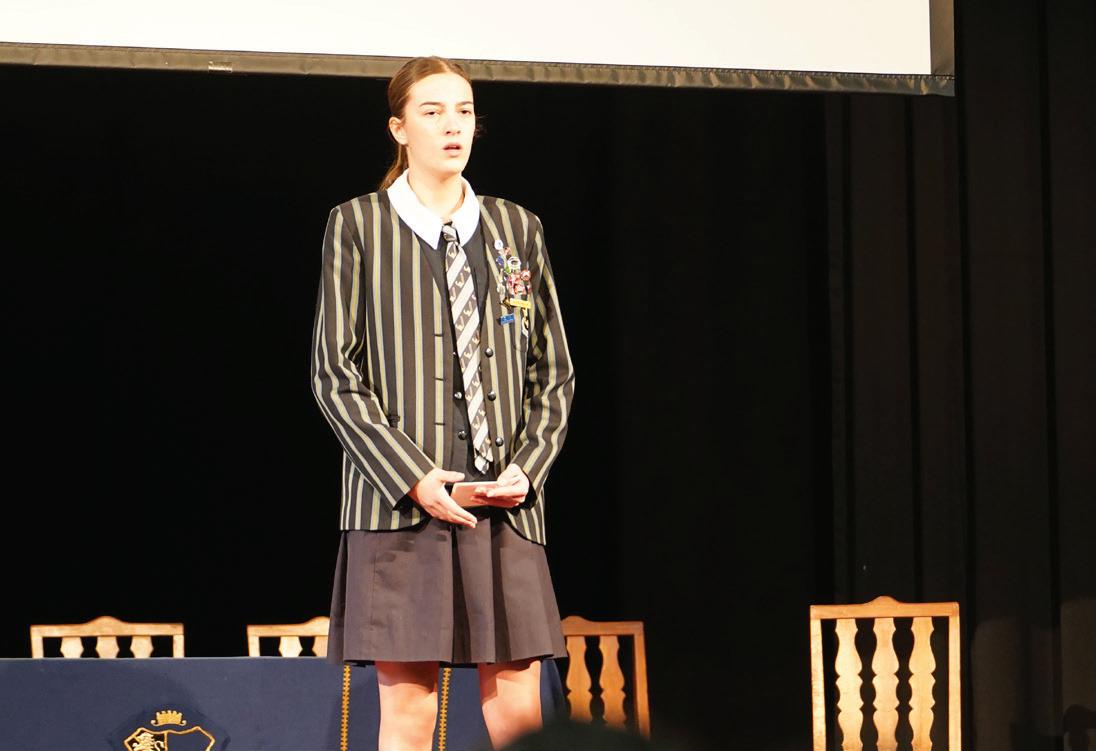
Recommended Previous Study
Completion of Level 2 English course or approval by Deputy Principal - Learning and Teaching.
Course Description
This course builds on skills of literary analysis established in Level 2 English. This course has an emphasis on developing written and oral communication skills which are transferable to any academic or industry based tertiary study, or workplace. Students focus on evaluative skills for all units, which include a written text of literary merit and a film of global recognition.
Respond critically to specified aspect(s) of studied written text(s).
Respond critically to specified aspect(s) of studied visual or oral text(s).
Respond critically to significant aspects of visual and /or oral texts through close reading, supported by evidence.
Create and deliver a fluent and coherent oral text which develops, sustains and structures ideas.
Produce a selection of fluent and coherent writing which develops, sustain and structures ideas.
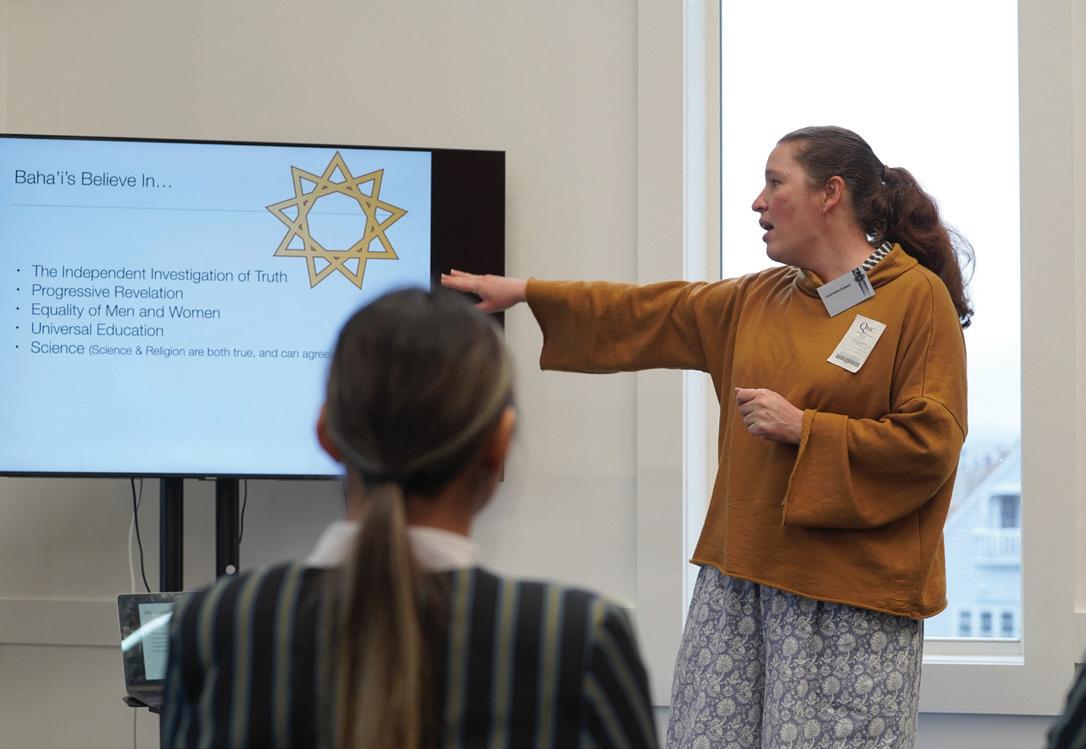
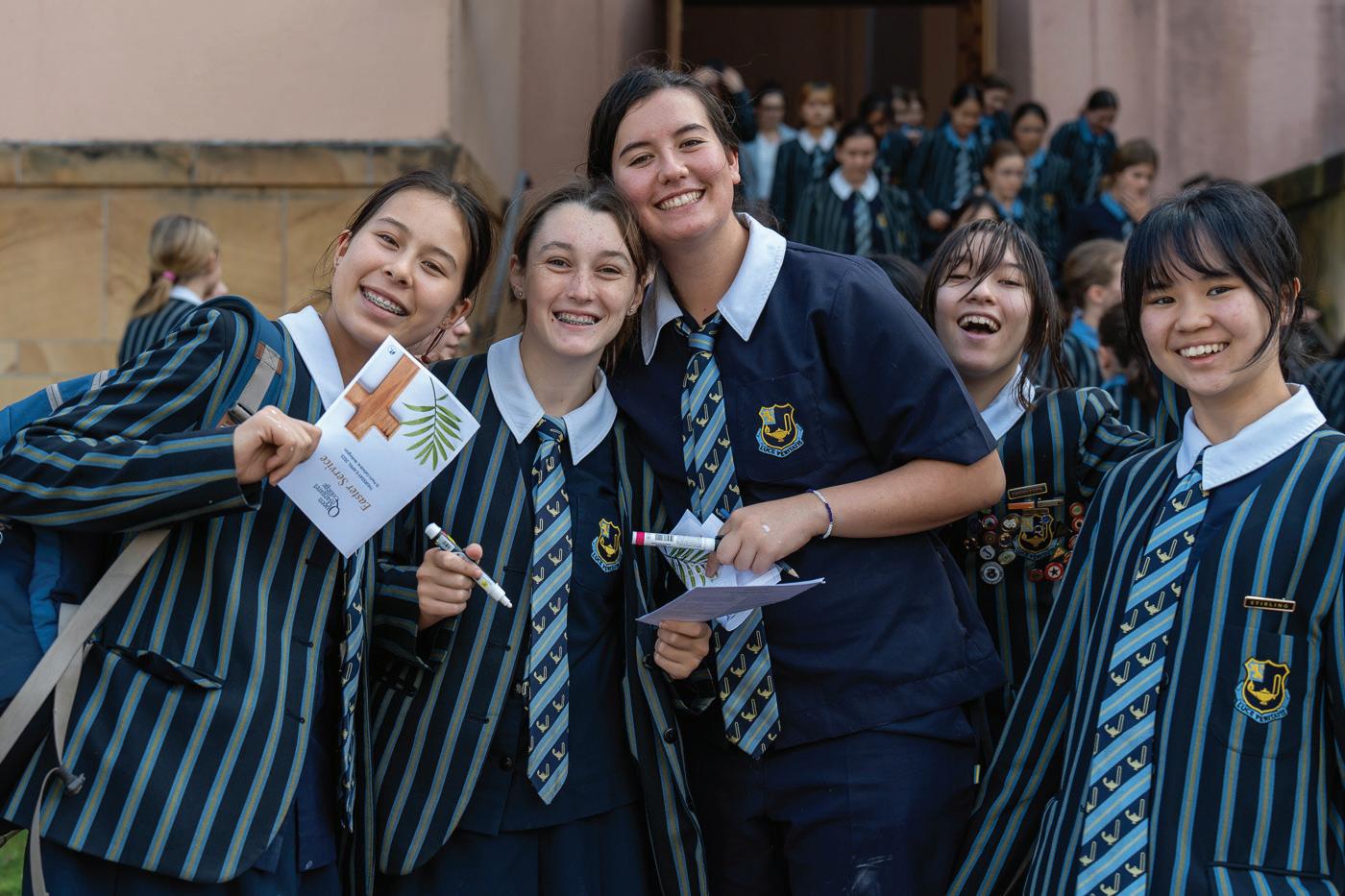
All Year 12 students participate in this weekly class which introduces them to a broad range of theories, ideas and beliefs relating to the contemporary world. In Ethics, they are encouraged to reflect upon moral theory and social and ethical issues, using the tools of critical analysis and evaluation in order to form their own worldview. In Philosophy, students discuss ultimate questions of meaning and purpose. The religious aspect of the course engages with a variety of world religions.
Year 13 students participate in a small group examination of religions and spirituality once a term with the Chaplain. This is aimed at developing their own sense of spirituality and reflecting upon their own personal formation.


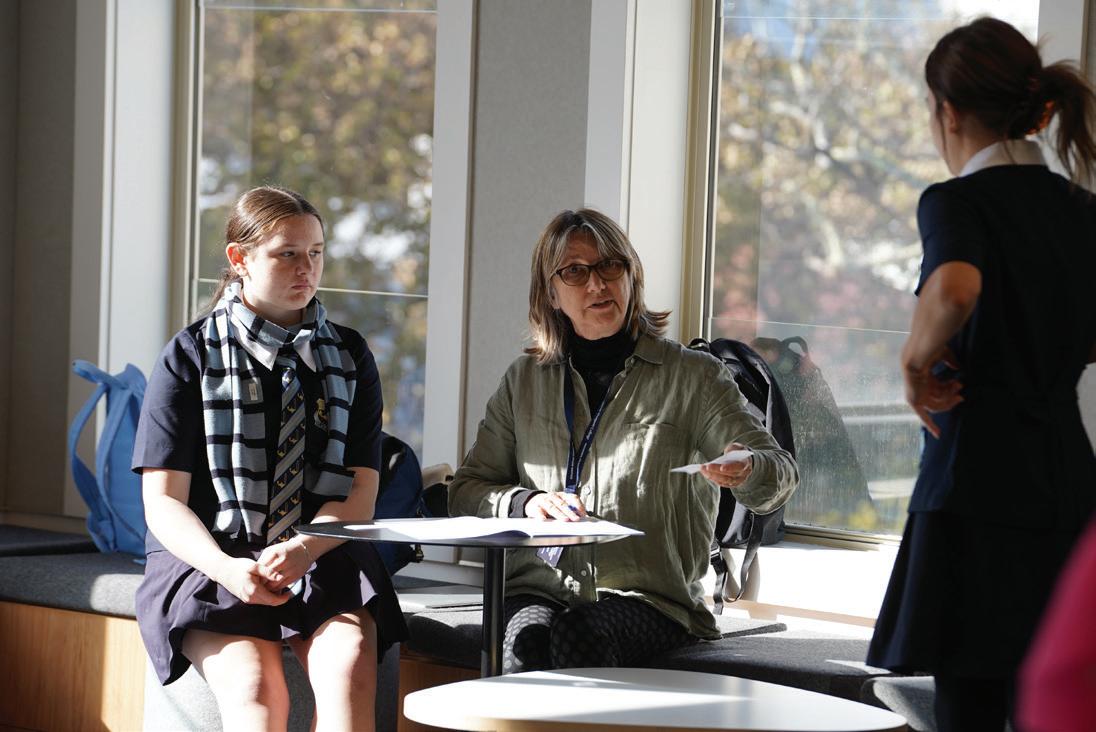
Recommended Previous Study
Completion of Level 1 French or approval by Deputy Principal - Learning and Teaching.
Course Description
By the end of Level 2, French students should be able to take part in discussions with French speakers, understand much of what is said and contribute relevant comments. They share information and justify their ideas and opinions in different situations. Students read a range of authentic materials and write a variety of texts to convey information in genuine contexts. They also prepare and deliver a two to three-minute speech in French.
Demonstrate understanding of a variety of spoken French texts on familiar matters.
Give a spoken presentation in French that communicates information, ideas and opinions.
Demonstrate understanding of a variety of written / or visual French text(s) on familiar matters.
Write a variety of text types in French to convey information, ideas and opinions in genuine contexts.
Students study the following topics: Friendship and relationships, health and well-being, the world of work, French-speaking countries and travel. They also have regular conversation practice with our French language assistant to help develop their speaking and listening skills.


Recommended Previous Study
Completion of Level 2 French or approval by Deputy Principal, Learning and Teaching.
Course Description
The aim of this course is for students to hold authentic conversations with French speakers, understand much of what is said, and contribute relevant comments. This interactive course requires students to create a portfolio of spoken French and write a variety of text types in which they explore,
Demonstrate understanding of a variety of extended spoken French texts.
Interact clearly using spoken French to explore and justify varied ideas and perspectives in different situations.
Demonstrate understanding of a variety of extended written / or visual French text(s).
Write a variety of text types in clear French to explore and justify varied ideas and perspectives.
evaluate and justify varied ideas and perspectives in different situations. Students study the following topics: media, new technology, global and environmental issues and multicultural France. They also have regular conversation practice with our French language assistant to help develop their speaking and listening skills.

Recommended Previous Study
Completion of Level 1 Geography course is an advantage but all students who have achieved NCEA Level 1 are able to select this course.
Course Description
Geography is a dynamic subject encompassing both arts and science. NCEA Level 2 students investigate a large natural environment as well as contemporary and global issues. The topics covered examine the interaction between people and the environments in which we live, with case studies taken from New Zealand and global contexts. This course aims to develop transferable skills that will stand students in good stead for future learning.
Explain aspects of a contemporary New Zealand geographic issue.
Explain aspects of a geographic topic at a global scale.

There is a strong focus on developing research skills as well as appreciating different viewpoints and being able to consider issues from various perspectives. Fieldwork is also an important aspect of this course. Students also develop other geographical skills such as resource analysis, diagrammatic representation, justification and evaluation.
Contributions
ϐ All students will be issued with a write-on Geography 2.4 Skills book. The cost of this (approximately $30) will be charged to your account
ϐ Conducting field work is an important aspect of studying NCEA Geography. Details and costs of field trips will be advertised in QM Notices.

Recommended Previous Study
Completion of Level 2 Geography course or approval by Deputy Principal - Learning and Teaching.
Course Description
Geography addresses contemporary and global issues that reflect the dynamic and interconnected environments in which we live. The NCEA Level 3 Geography course builds on the foundations of Levels 1 and 2 and moves from a descriptive and explanatory expectation to one of analysis. It equips students with transferable skills desired by employers in the modern workplace. Students develop the independent research skills necessary for future learning beyond the school environment. They are also required to collaborate with others and form an appreciation of perspectives; essential skills in the diverse societies that
Demonstrate understanding of how a cultural
Demonstrate understanding of a given environment(s) through selection and application of geographic concepts and skills.
Conduct geographic research with consultation.
Analyse aspects of a contemporary geographic issue.
Analyse aspects of a geographic topic at a global scale

today’s students will be expected to work within. As well as contemporary and global issues, students will analyse a cultural process and its impact on people and environments. Case studies will be taken from both New Zealand and overseas settings. Fieldwork is an important aspect of this course. Traditional geographic skills of resource interpretation, mapping and graphing are also covered.
Contributions
ϐ All students will be issued with a write-on Geography 3.4 Skills book. The cost of this (approximately $30) will be charged to your account
ϐ Conducting field work is an important aspect of studying NCEA Geography. Details and costs of field trips will be advertised in QM Notices.


Recommended Previous Study
Completion of Level 1 History course or approval by Deputy Principal - Learning and Teaching.
Course Description
This course allows students to examine key concepts that have shaped the world. These include nationalism, international relations and social and political change. Twentieth century case studies such as the Holocaust; how
was it humanly possible, and the Red Scare; the world with nuclear weapons, will be used to explore these concepts. Students will develop their research skills and their essay writing skills. They will discuss the reasons why events are historically significant and will learn to think critically about the past.
Contributions
ϐ All students will be charged approximately $30 for a workbook.
Examine causes and consequences of a significant historical event.


Recommended Previous Study
Completion of Level 2 History course or approval by Deputy Principal - Learning and Teaching.
Course Description
The aim of the History course at Year 13 is to gain an understanding of how international events were of significance to New Zealanders. The main theme of study is imperialism, with emphasis on the British Empire. The main focus will be the impact of British imperialism in India and Palestine, leading to the creation of Israel.
Research an historical event or place of significance to New Zealanders, using primary and secondary sources.
Analyse an historical event, or place, of significance to New Zealanders.
Analyse evidence relating to an historical event of significance to New Zealanders.
Analyse the causes and consequences of a significant historical event.
Links will then be made to the colonisation of New Zealand and the key concept of sovereignty. Students develop their understanding and skills in information gathering, processing and presentation to a very high level, which equips them well for tertiary studies in any field.
Contributions
ϐ All students will be charged approximately $30 for a workbook.

Recommended Previous Study
Completion of Level 1 Japanese course or approval by Deputy Principal - Learning and Teaching.
Course Description
By the end of Level 2 Japanese, students should be able to comprehend detail and summarise meaning in spoken and written Japanese. They deliver a two-minute speech in Japanese and initiate and maintain conversations.

Students also write extended passages of Japanese, presenting ideas and information logically and demonstrating their expanding knowledge of Kanji. Students study the following topics: family life, food and health, the Japanese education system and leisure activities. They also have regular conversation practice with our Japanese language assistant to help develop their speaking and listening skills.
Contributions
ϐ Students will be charged for a grammar handbook – approximately $10.
Write a variety of text types in Japanese to convey information,

Recommended Previous Study
Completion of Level 2 Japanese course or approval by Deputy Principal - Learning and Teaching.
Course Description
The aim of this course is to enable students to interact in a variety of situations, recognise finer details in spoken and written Japanese texts and draw inferences and conclusions. They will use language patterns
Demonstrate
Give a clear spoken presentation in Japanese that communicates a critical response to stimulus material.
Interact clearly using spoken Japanese to explore and justify varied ideas and perspectives in different situations.
Demonstrate understanding of a variety of extended written / or visual Japanese text(s).
Write a variety of text types in clear Japanese to explore and justify varied ideas and perspectives.

spontaneously and develop and support their points of view. Students will study the following topics: geography, living in town and in the country, travel and tourism, Japan at work, communication and the media. They also have regular conversation practice with our Japanese language assistant to help develop their speaking and listening skills.
Contributions
ϐ Students will be charged for: a ‘Renash’ NCEA level 3 vocabulary and grammar handbook –approximately $20.
(AS91554, 3.2 can be taken in place of AS91555 or as an optional extra standard))
Recommended Previous Study
Attained at least 18 credits in Level 1 Materials Technology course or approval by Deputy Principal - Learning and Teaching.
Course Description
Students will work on two major units of work over the course of the year. Practical outcomes are undertaken providing students with the opportunity to work with a variety of materials. Each unit of work requires completion of research, design development work, written tasks and a practical solution. Development of unique patterns through conceptual design idea generation and pattern adaptation will be a focus of level two construction processes. Topic one, ‘Junky Styling’ has a focus on sustainability issues in the fashion industry. A written case study report on the issues of sustainable design produced alongside this topic is externally assessed as part of the course, by folio submission. Topic two, ‘Inspirational Design’ has a focus on exploring self-selected themes and creating a garment developed from researched inspiration sources.
Contributions
ϐ There is a $50+gst annual consumables fee for Materials Technology. This will be charged to your school account.
Undertake

ϐ There may be planned trips / visiting speakers throughout the year which are necessary to develop knowledge for some assessment tasks in the unit topics. You will be notified of any costs associated with any trips or speakers (eg: travel, entry fees). Costs incurred will be charged to your school account.
ϐ Students who elect to enter their project work into any design competitions (eg: OverSew Fashion Awards competition / HETTANZ Student fashion Awards) will be required to pay their own entry fee and courier ticket costs.
Recommended Previous Study
Completion of Level 2 Materials Technology course or approval by Deputy Principal - Teaching and Learning.
Course Description
This course builds on the technological skills and understanding developed in the Year 12 course but with a client focus. Students at this level are working with an identified client and the final outcome of their project must meet the needs of this client. This course has a project management focus where students work on an independent long term project, requiring them to plan and manage their own time, resources and outcome development. Topics will require completion of research, design, development work, pattern-making, written tasks and a practical solution. A written case study report topic is externally assessed as part of the course, by folio submission.
Contributions:
ϐ There is a $60+gst annual consumables fee for Materials Technology. This will be charged to your school account.
ϐ Students will work on individual practical projects that will require them to purchase some of their own material resources. Specific details will be given to students at the start of each topic.

ϐ There may be planned trips / visiting speakers throughout the year which are necessary to develop knowledge for some assessment tasks in the unit topics. You will be notified of any costs associated with any trips or speakers (eg: travel, entry fees). Costs incurred will be charged to your school account.
ϐ Students who opt to enter Scholarship in Technology will be required to scan and colour print approx. 70 pages from their project visual diary to accompany their Scholarship report submission as required evidence of own practice. Colour photocopy or printing costs are the responsibility of the student.

Recommended Previous Study
Merit endorsement in Mathematics at Level 1 or approval by Deputy Principal - Learning and Teaching.
Course Description
NCEA Level 2 Mathematics is designed to suit those who enjoy more abstract concepts found in algebra, geometry and calculus. Students taking this course may be intending

further studies that require mathematical understanding, such as physics, engineering, technology or economics. The course leads naturally onto NCEA Level 3 Calculus in Year 13.
Contributions
ϐ All students will be issued with individual workbooks at approximately $40.

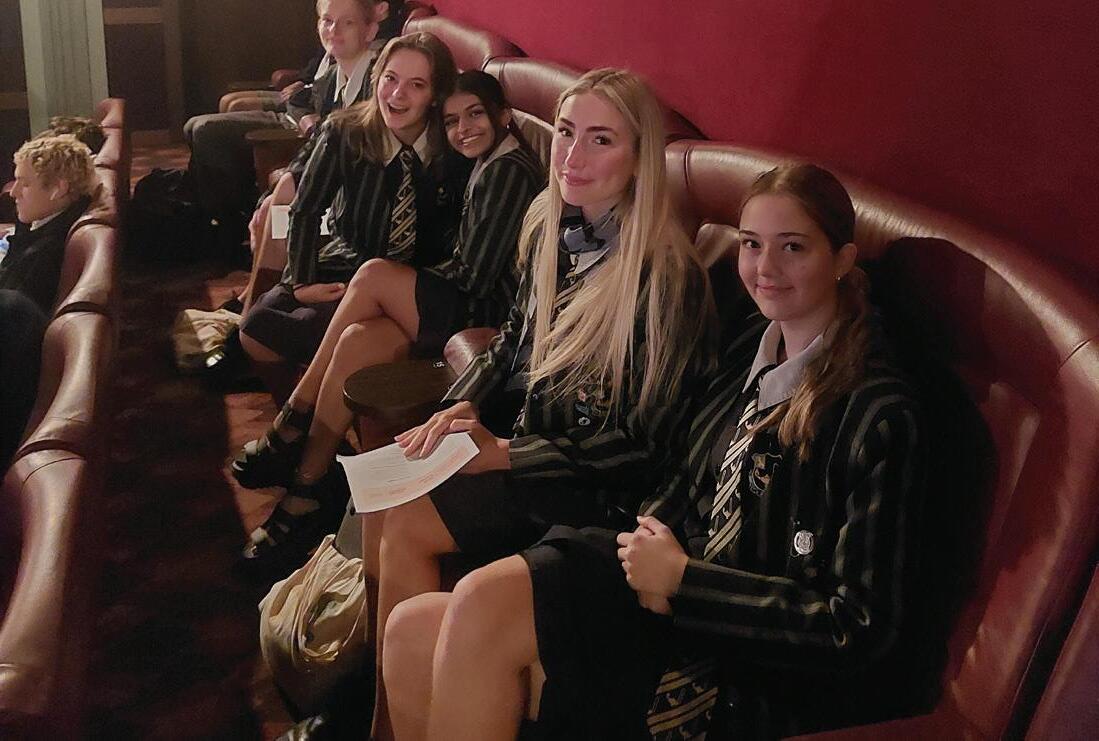
Recommended Previous Study
All students who have gained NCEA Level 1 are able to select this course.
Course Description
This NCEA Level 2 course gives students an understanding that society is saturated with media texts that have an impact on our lifestyle as much as we, the audience, have an impact on them. The focus is on learning about the
Demonstrate understanding of narrative in media texts.
Write a developed media text for a specific target audience.
Demonstrate understanding of an aspect of a media genre.
Produce a design for a developed media product using a range of conventions.
Complete a developed media product from a design and plan using a range of conventions.
2.5
modern media we encounter every day and the social, cultural and economic relationship the media has with society. It enables students to discuss and analyse both the medium and the message. Students explore the conventions, audience and purpose of various media texts, looking specifically at film and television media. They also have the opportunity to create a media product, a film trailer, from concept development through to postproduction.


Recommended Previous Study
Completion of Level 2 Media Studies course or approval by Deputy Principal - Learning and Teaching.
Course Description
Media Studies students will look in depth at media issues, investigate a media genre and examine the impact of films. This course has a large theoretical component which consistently encourages students to critically
Demonstrate
Produce a media product to meet the requirements of a brief.
Demonstrate understanding of a significant development in the media.
analyse media texts and academic sources. Media texts are examined for their social, cultural, economic and ethical influence on our society. The Year 13 course also develops the production skills gained in Year 12 Media Studies, demanding a higher level of concept development and preparation for a longer media production as well as a more sophisticated final product. The practical focus at Level 3 is on short film production.
Recommended Previous Study
Completion of Level 1 Music course or approval by Deputy Principal - Learning and Teaching.
Course Description
NCEA Level 2 Music offers choice to the developing musician, with achievement standards being offered in both Music Studies and Making Music. Students can develop their composition and performance skills, offering more than one instrument if desired, while developing their knowledge, understanding and application in the areas of both written conventions of music and aural perception. The skill of Instrumentation is introduced while the students can gain more depth of understanding of musical history by studying discrete music works, as well as pursue an area of musical interest by investigating an aspect of New Zealand music. Students who take this course should have an active interest and ability in Music and have completed at least three years’ instrumental or vocal tuition. To achieve at the level required, students should also be having regular music tuition in a selected instrument, either through the College or privately, and be part of at least one senior extra-curricular music group.

Assessment
Students will select standards from the following options to create a programme which offers 20-22 credits. This conversation will take place with their teacher to ensure the programme is balanced and works to the strengths and interests of the student.
Recommended Previous Study
Completion of Level 2 Music course or approval by Deputy Principal - Learning and Teaching.
Course Description
NCEA Level 3 Music offers a wide choice to the advanced musician, with achievement standards being offered in both Music Studies and Making Music. This allows students to specialise (e.g. in performance, composition or musicology) or to continue to pursue a holistic course. Previously learned skills in analysis, research and musical conventions are enhanced further, with arrangement skills being introduced and the analysis of a substantial set work as well as researching a musical area of interest. The course offers a sound preparation for study of Music at tertiary level. Students who take this course must have an active interest and ability in Music and have completed at least four years’ instrumental or vocal tuition. To achieve at the level required, students should also be having regular music tuition in a selected instrument, either through the College or privately, and be part of at least one senior extra-curricular music group.

Assessment
Students will select standards from the following options to create a programme which offers 20-22 credits. This conversation will take place with their teacher to ensure the programme is balanced and works to the strengths and interests of the student.

Recommended Previous Study
Completion of Level 1 Physical Education course or approval by Deputy Principal - Learning and Teaching.
Course Description
Biophysical Principles
In Level 2 Physical Education we take a wider look at the biophysical principles and how these are applied to develop performance improvement. Students explore the concept of fitness and learn about different methods of training and principles of training to enhance fitness levels. They analyse human movement and apply biomechanical principles, skill acquisition and sports psychology principles to develop performance improvement.
Societal Issues in Sport & Physical Activity
We explore the wider impacts sport and physical activity has on society as a whole:
ϐ Examine different types of physical activity and their impact
ϐ Exploring the concepts of social responsibility and the role this has within physical activity.
Sport & Physical Activity Development
Our aim is to expose the students to a wide range of different sports and physical activity. Students have the opportunity to:
ϐ Train and prepare for an individual endurance event (Tough Guy and Gal Challenge)
ϐ Develop skills around volleyball
ϐ Explore social responsibility in a range of contexts, including rock climbing and group fitness classes
Contributions
ϐ Tough Guy and Tough Girl - There is a $45 entry fee plus travel cost.
Recommended Previous Study
Completion of Level 2 Physical Education course or approval by Deputy Principal - Learning and Teaching.
Course Description
Biophysical Principles
In Level 3 Physical Education we specialise in and question and challenge the specific application of the biophysical principles to individual performance improvement.
ϐ Biomechanically analyse a skill and give feedback on how to improve performance
ϐ Evaluate and question the effectiveness of the standardised training programme for improvement in American Football
ϐ Design strategies to make changes to a general training programme to ensure individual adaptation to enhance personal skill development.
Physical Activity and wellbeing
Students have the opportunity the critically examine physical activity experiences to devise strategies for lifelong well-being. Through a multidisciplinary approach, students delve into the dynamic interplay between physical activity, mental health, and overall wellness. Examples include:
ϐ Societal roles, media influence, personal, interpersonal and societal factors on physical activity and wellbeing
ϐ Participate in a wider range of physical activities to devise strategies for lifelong wellbeing.

Our aim is to expose the students to a wide range of different sports and physical activity. Students have the opportunity to:
ϐ Train to develop skills for American Football
ϐ Learn and develop skills around softball or a physical activity chosen by the class.
ϐ Learn and develop leadership skills through coaching Middle School students
Additionally, students are offered the opportunity to sit scholarship PE, which is a research project conducted throughout the year and submitted in October.
Students may be taught by external providers to be able to enhance skill development. The activities will be charged to parents' accounts as they take place.


Recommended Previous Study
Achievement of the mechanics, waves and electricity achievement standards in the Year 11 Physics & Chemistry course or approval by the Deputy Principal - Learning and Teaching. Students should also have confidence in mathematical techniques, particularly algebra and trigonometry.
Course Description
This course aims to give students an understanding of and the ability to use concepts, principles and models in Physics to explain physical phenomena, systems and devices. Topics include atomic and nuclear physics, wave systems, mechanics, and practical skills.
Contributions
ϐ Students will be charged approximately $25 for a workbook.
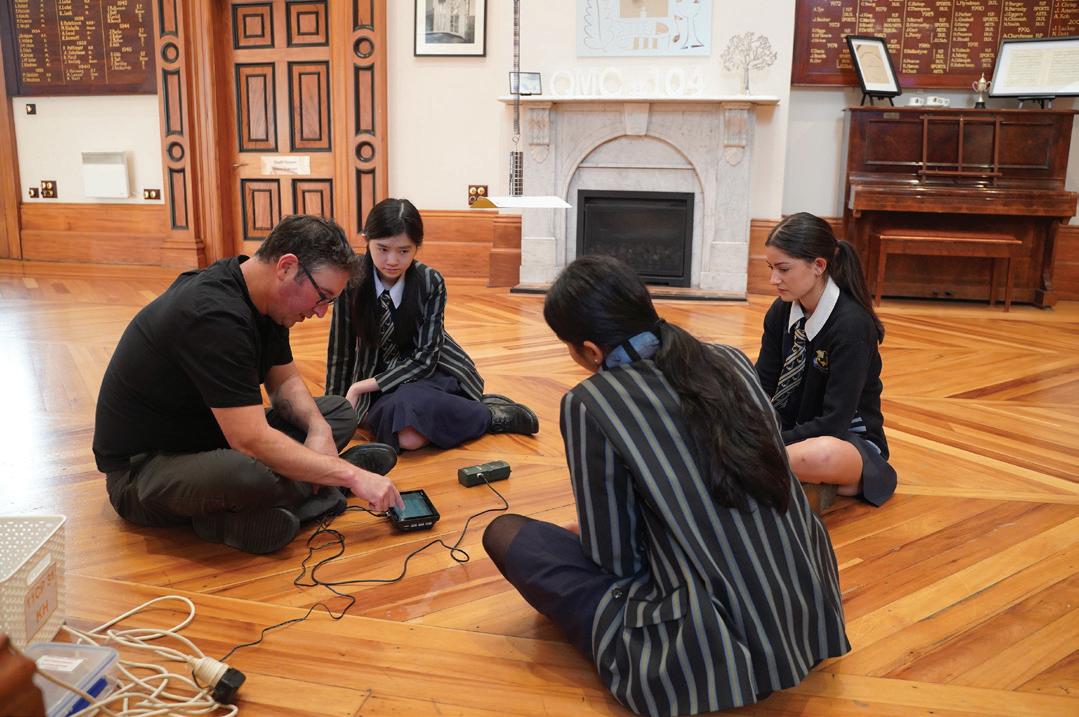

Recommended Previous Study
Achievement in all standards in Level 2 Physics, with some at Merit, or approval by Deputy Principal - Learning and Teaching. Confidence in mathematical techniques, particularly algebra and trigonometry, is recommended.
Course Description
The course will build upon content studied in Level 2 Physics in the areas of modern physics, wave systems, mechanics, and practical skills. This course will prepare students for further study in areas such as science, engineering, healthcare.
Contributions
ϐ Students will be charged approximately $25 for a workbook.
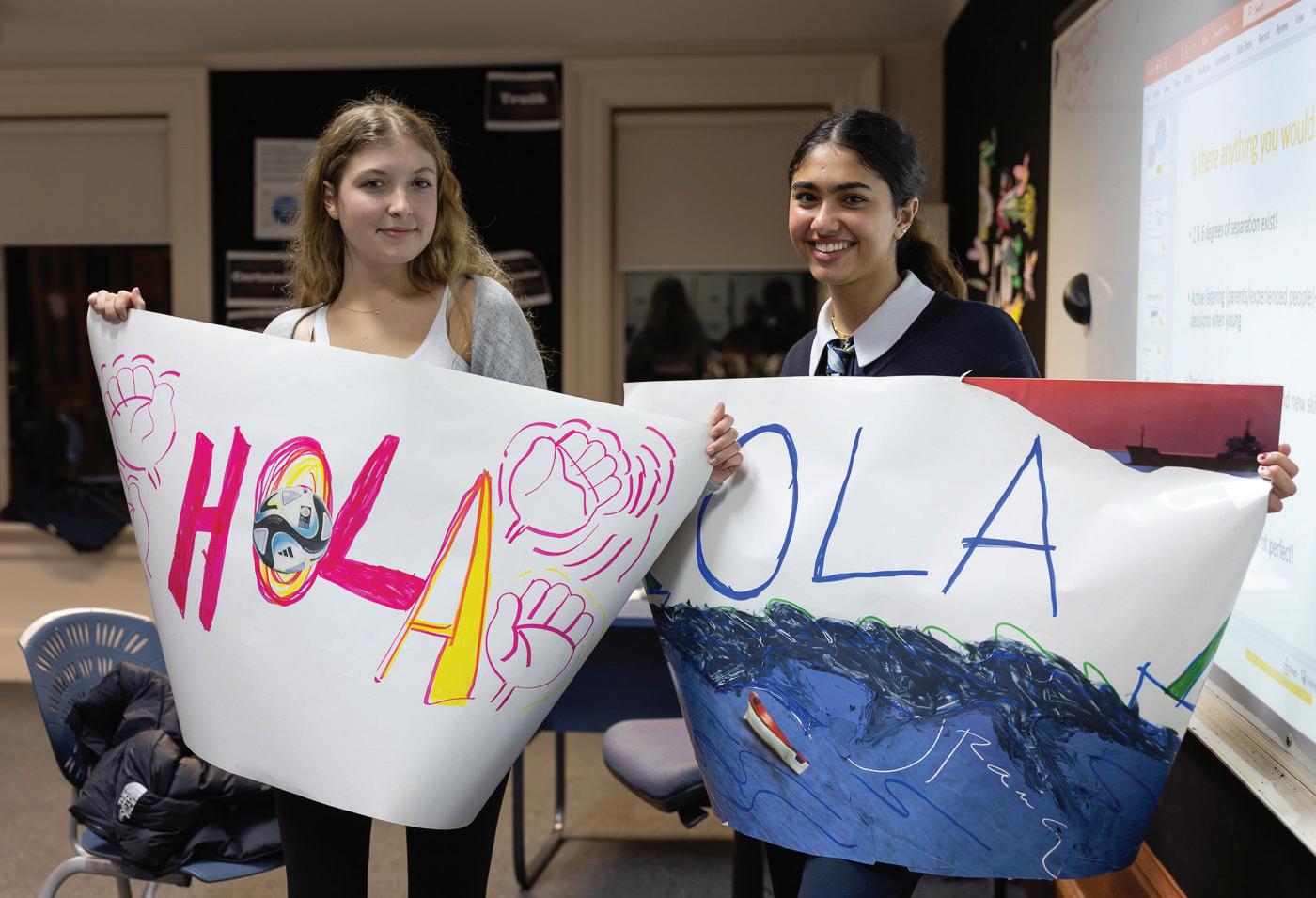
Recommended Previous Study
Completion of Level 1 Spanish course or approval by Deputy Principal - Learning and Teaching.
Course Description
This course enables students to communicate capably in spoken and written Spanish on topics of personal interest and global significance. They write a variety of text types in which they share information, express ideas and justify their own opinions. Students also deliver a two-minute speech in Spanish. They hone their comprehension skills
Demonstrate understanding of a variety of spoken Spanish texts on familiar matters.
Give a spoken presentation in Spanish that communicates information, ideas and opinions.
Demonstrate understanding of a variety of written and/or visual Spanish text(s) on familiar matters.
Write a variety of text types in Spanish to convey information, ideas and opinions in genuine contexts.


through exposure to a range of authentic reading and listening materials. Students study the following topics: social relations, future plans and becoming a responsible global citizen. They also have regular conversation practice with our Spanish language assistant to help develop their speaking and listening skills.
Contributions
ϐ Students will be charged for a grammar workbook – approximately $40.

Recommended Previous Study
Completion of Level 2 Spanish course or approval by Deputy Principal - Learning and Teaching.
Course Description
The aim of this course is for students to hold competent conversations with Spanish speakers, understand much of what is said, and contribute relevant comments.
They explain and debate about many of their own ideas and opinions in portfolios of spoken interactions and written texts in which they explore and justify varied ideas and perspectives in different situations. Students may also deliver a two to three- minute speech in Spanish.
They study the following topics: the modern Hispanic world, social issues in the 21st century, and the environment.Students also have regular conversation practice with our Spanish language assistant to help develop their speaking and listening skills.
Contributions
ϐ Students will be charged for a grammar workbook if not already purchased in Year 12 – approximately $40.
Demonstrate understanding of a variety of
spoken Spanish
Give a clear spoken presentation in Spanish that communicates a critical response to stimulus material. (AS91569, 3.2 can be taken in place of AS91570)
Interact clearly using spoken Spanish to explore and justify varied ideas and perspectives in different situations.
Demonstrate understanding of a variety of extended written and/or visual Spanish texts.
Write a variety of text types in clear Spanish to explore and justify varied ideas and perspectives.

Recommended Previous Study
Completion of Level 1 Mathematics course or approval by Deputy Principal - Learning and Teaching.
Course Description
NCEA Level 2 Statistics has a practical focus and contains mostly internally assessed probability and statistics standards.

Students taking this course may be intending further studies in the humanities, arts, or languages. The course leads naturally onto NCEA Level 3 Statistics in Year 13.
Contributions
ϐ Students will be charge approximately $40 for a workbook.
Conduct an experiment to investigate a situation using statistical methods.
Investigate a situation involving elements of chance using a simulation.

Recommended Previous Study Gained at least Merit for Level 2 probability methods (91267) or approval from Deputy Principal - Learning and Teaching.
Course Description
NCEA Level 3 Statistics is suited to those students who have good language skills, enjoy using technology to investigate and analyse data, and are able to explain clearly what their answers mean in context. The course contains a mixture of internal and external standards.
Apply
Conduct

Students taking this course may be intending further studies in the humanities, arts or languages.
Contributions:
ϐ All students will be issued with individual workbooks at an approximate cost of $40.
Recommended Previous Study
Completion of Level 1/2 Te Reo Māori or approval by Deputy Principal - Learning and Teaching.
Course Description
By the end of NCEA Level 2 and 3, Te reo Māori students should be able to engage in discussions using te reo Māori, understanding much of what is said. They should be able to read and understand a variety of text types in familiar and unfamiliar contexts. Students will study the following topics: my favourite hobby, my hopes and dreams, youth issues and national issues (Level 3).


Recommended Previous Study
Completion of Level 1 Visual Art course or approval by Deputy Principal - Learning and Teaching.
Course Description
Design is a specialist Visual Art subject. This is a practical course enabling students to develop an awareness of design concepts through research, documentation and creative problem solving. Students explore their chosen brief using the design process. They develop skill and understanding through research of established and contemporary practice, the creation and manipulation of imagery and the application of typography.
Use drawing to demonstrate understanding of conventions appropriate to design.
Systematically clarify ideas using drawing informed by established design practice.
Produce a systematic body of work that integrates conventions and regenerates ideas within design practice.

Students draw with a range of media, a camera and using Adobe Photoshop, Illustrator, and InDesign.
Contributions
ϐ There is a consumables fee of approximately $100 which will be charged to student’s school account. Please note that this will cover both the student’s art kit and materials.
ϐ Students in this course will need to purchase the Adobe Creative Cloud suite for approximately $10. This gives them a one year subscription to industry standard software such as Adobe Photoshop, Illustrator, and InDesign. This will be installed at school and charged to students' school accounts.

Recommended Previous Study
Completion of Level 1 Visual Art course or approval by Deputy Principal - Learning and Teaching.
Course Description
At Level 2, students work on completely individualised programmes. Level 2 practical Art is a broad-based subject including drawing, painting and printmaking. Students study and apply the underpinning procedures and processes within these disciplines. They relate their studio practice to that of an established artist or genre and engage in critical evaluation. Students will select two internals and one external standard from the table below, providing 20 credits in total.
Develop ideas in a related series of drawings appropriate to established painting practice.
Develop ideas in a related series of drawings appropriate to established printmaking practice.
Use drawing methods to apply knowledge of conventions appropriate to printmaking.
Produce a systematic body of work that show understanding of art making conventions and ideas with either printmaking or painting.

ϐ There is a consumables fee of approximately $150 which will be charged to student’s school account. Please note that this will cover both the student’s art kit and materials.
ϐ Students in this course have the option to purchase the Adobe Creative Cloud suite for approximately $40. This gives them a one-year subscription to industry standard software such as Adobe Photoshop, Illustrator, and InDesign. This will be installed at school and charged to students' school accounts.
(Painting)
AS91321, 2.4 or AS91323, 2.4

Recommended Previous Study
Completion of Level 1 Visual Art course or approval by Deputy Principal - Learning and Teaching.
Course Description
Photography is a specialist Visual Art subject. This is a mostly practical course that enables the student to develop an understanding of photographic concepts and develop technical skills, including the using digital SLR and mirrorless cameras, studio lighting and Adobe Photoshop. There is also a focus on research of established and contemporary photographers to inform ideas and thinking. Students are encouraged to work independently and have the opportunity to investigate a range a genre throughout the year. Students will complete two internals
Use drawing methods to apply knowledge of conventions appropriate to photography.
Develop ideas in a related series of drawings appropriate to established photography practice.
Produce a systematic body of work that shows understanding of art making conventions and ideas within photography (Folio).

and one external standard from the table below, providing 20 credits in total. Access to a digital SLR camera and to Adobe Creative Cloud is required.
Contributions
ϐ There is a consumables fee of approximately $100, which will be charged to student’s school account. Please note that this will cover both the student’s art kit and materials.
ϐ Students in this course are required to purchase the Adobe Creative Cloud suite for approximately $10. This gives them a one year subscription to industry standard software such as Adobe Photoshop, Illustrator, and InDesign. This will be installed at school and charged to students' school accounts.

Recommended Previous Study
Completion of Level 2 Design or approval by Deputy Principal – Learning and Teaching.
Course Description
Design is a specialist Visual Art subject. This is a practical course enabling students to develop an awareness of design concepts through research, documentation and creative problem solving. Students explore their chosen brief using the design process. They develop skill and understanding through research of established and contemporary practice, the creation and manipulation of imagery and the application of typography. Students draw with a range of media, a camera and using Adobe Photoshop, Illustrator, and InDesign.
Use drawing to demonstrate understanding of conventions appropriate to design.
Systematically clarify ideas using drawing informed by established design practice.
Produce a systematic body of work that integrates conventions and regenerates ideas within design. (folio)

ϐ There is a consumables fee of approximately $100 which will be charged to student’s school account. Please note that this will cover both the student’s art kit and materials.
ϐ Students in this course will need to purchase the Adobe Creative Cloud suite for approximately $10. This gives them a one year subscription to industry standard software such as Adobe Photoshop, Illustrator, and InDesign. This will be installed at school and charged to students' school accounts.


Recommended Previous Study
Completion of Level 2 Photography, Visual Art: Painting and Printmaking or Visual Art: Design course or approval by Deputy Principal - Learning and Teaching.
Course Description
Photography is a specialist Visual Art subject. Over the course of the year students develop their own individual programme and thematic direction with two internals forming the foundation for their final folio and Scholarship (if applicable)
Students build photographic technical skills including digital SLR and mirrorless camera technique, studio lighting and image editing in Adobe Photoshop. Research of established and contemporary photographic practice is used by students to develop critical thinking and to extend their own ideas and creativity.
Use drawing to demonstrate understanding of conventions appropriate to photography.
Systematically clarify ideas using drawing informed by established photography practice.
Produce a systematic body of work that integrates conventions and regenerates ideas within photography. (folio)

Access to a digital SLR camera and to Adobe Creative Cloud is required.
Contributions
ϐ There is a consumables fee of approximately $100 which will be charged to student’s school account. Please note that this will cover both the student’s art kit and materials.
ϐ Students in this course are required to purchase the Adobe Creative Cloud suite for approximately $10. This gives them a one year subscription to industry standard software such as Adobe
ϐ Photoshop, Illustrator, and InDesign. This will be installed at school and charged to students' school accounts.

Recommended Previous Study
Completion of Level 2 Visual Art: Painting and Printmaking course or approval by Deputy Principal - Learning and Teaching.
Course Description
Printmaking is a specialist Visual Art subject. The aim of this course of study is for students to develop an understanding of printmaking procedures and practices and to apply and extend this knowledge within their own studio practice. The two internal standards are drawing studies within Printmaking and are the foundation for the external standard where students apply their experience and understanding of creative processes and procedures to produce a cohesive body of prints. Students will use research of established and contemporary practice to extend their ideas. Through a range of tasks (research,

drawing, annotation, sequential studies, small works and finished prints), students will demonstrate the development, clarification, and resolution of ideas, along with print processes and pictorial concerns. The methodology and independent focus of this course is similar to tertiary study.
Contributions
ϐ There is a consumables fee of approximately $150 which will be charged to student’s school account. Please note that this will cover both the student’s art kit and materials.
ϐ Students in this course have the option to purchase the Adobe Creative Cloud suite for approximately $10. This gives them a one year subscription to industry standard software such as Adobe Photoshop, Illustrator, and InDesign. This will be installed at school and charged to students' school accounts.


to produce a cohesive body of paintings. Students will will be installed at school and charged to students' school accounts.
Use drawing to demonstrate understanding of conventions appropriate to painting.
Systematically clarify ideas using drawing informed by established painting practice.
Produce a systematic body of work that integrates conventions and regenerates ideas within painting practice.
The achievement standards listed for each subject have been chosen carefully, but are subject to change.


Recognising the increased financial demands on families, we are committed to a more structured, transparent, and sustainable approach to student travel. Our goal is to ensure that these trips are both educational and manageable for everyone involved. Sports and other cocurricular trips to remain opportunistic and outside the fixed calendar. The plan for 2026-2029 is as follows:
For many, the question of “Where to?” after secondary school looms large. The internet has numerous sites which offer advice and guidance for secondary students. A New Zealand website that might be worth visiting is https:// www.careers. govt.nz/plan-your-career/ Students are also welcome to seek advice from the school’s Careers Director.
University websites contain a wealth of relevant information and should be consulted before final decisions are made about future tertiary or career pathways.
University of Auckland www.auckland.ac.nz
Auckland University of Technology www.aut.ac.nz
University of Canterbury www.canterbury.ac.nz
Lincoln University www.lincoln.ac.nz
Massey University (Albany, Palmerston North, Wellington) www.massey.ac.nz
University of Otago www.otago.ac.nz
Victoria University of Wellington www.vuw.ac.nz
University of Waikato www.waikato.ac.nz
Wellington Institute of Technology www.weltec.ac.nz
Please check with your preferred university directly. A few possibilities are shown below.
Australian National University www.anu.edu.au
Cambridge University, UK www.cam.ac.uk
Duke University, USA www.duke.edu
Harvard, USA www.harvard.edu
University of Melbourne www.unimelb.edu.au
MIT, USA www.mit.edu
Monash University www.monash.edu.au
Oxford University, UK www.ox.ac.uk
Princeton University, USA www.princeton.edu
University of Queensland www.uq.edu.au
Stanford University, USA www.stanford.edu
University of Sydney www.usyd.edu.au
Yale University, USA www.yale.edu
*Year 1 - 6
* Year 1– 6
Transdisciplinary Approach:
Six Key Themes are studied over the course of the year. These themes cover all learning areas. In addition we offer specialist teaching in Music, Dance, French, Te Reo Māori and Religious Education.
English


queenmargaretcollege
queenmargaretcollege